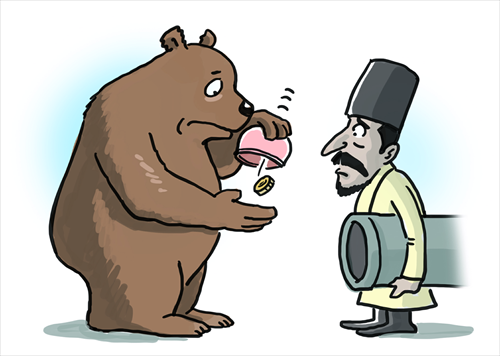


Illustration: Liu Rui/GT
Russia's gas giant Gazprom has recently announced its plans to cut the volume of natural gas imports from Turkmenistan and Uzbekistan this year. Alexander Medvedev, deputy chairman of the company, noted that Gazprom would reduce gas purchases from Turkmenistan from 10 billion cubic meters to 4 billion per year and the amount from Uzbekistan from 3.8 billion to around 1 billion. Russia will replace the imports with its own gas supply.
The news is not surprising because Gazprom declared about half a year ago that it would give up importing natural gas from Central Asia. Nevertheless, the decision of Russia to completely waive gas purchases so rapidly has signaled the unpredictable volatility of the market, since the country has monopolized natural gas exports of Central Asia for several decades.
Turkmenistan and Uzbekistan boast abundant natural gas resources. The Central Asia-Center gas pipeline system built between 1960 and 1988 was the only channel for Central Asia to transmit its natural gas to other countries. After the dissolution of the Soviet Union in 1991, Russia took advantage of its monopoly position to buy gas from Central Asia and then resell it at a profit. The peak of Russia's gas purchases came in 2008 when the country bought more than 40 billion cubic meters from Turkmenistan and nearly 15 billion cubic meters from Uzbekistan.
However, the international economic crisis that started in 2008 has dealt a heavy blow to Russia's natural gas trade. The blast of the Central Asia-Center gas pipeline in the spring of 2009 plunged Turkmen gas exports to Russia to 10 billion cubic meters per year. The construction of the Central Asia-China gas pipeline has turned China into the largest importer of Turkmenistan's natural gas.
Uzbekistan is in a slightly different situation as it has been suffering from a decline in yield but an increase in consumption since 2008. Its weakening ability to export gas means it has barely been able to ensure a stable supply to Russia, which has angered Moscow.
A decade ago, Moscow needed to buy natural gas from Central Asia to satisfy the rising demand from Europe and the Commonwealth of the Independent States as well as to make up its own insufficient capacity in gas exploitation. But now, given a sluggish European market and a slumping volume of purchases from Ukraine, Russia's gas production capacity is 20 percent higher than the actual demand. Therefore, Moscow hopes to fully utilize its own natural gas instead of serving as a porter of gas from Central Asia.
Giving up purchasing natural gas from Central Asia has also revealed a hint of embarrassment for Moscow against the present international backdrop. Because of gas price hikes in Central Asia since 2008, Russia is making less profit from reselling gas while the Kremlin has also exempted tariffs for it. Therefore, Russia will earn more by using its own gas.
So where will the almost 10 billion cubic meters of the Turkmen and Uzbek gas surplus go? The best choice in the short term is to export to China, with which both countries already have large-scale gas deals.
In the long term, Turkmenistan is working with a multi-vector approach in its gas export policy. Apart from exporting natural gas to Russia, China and Iran, it is actively developing the Turkmenistan-Afghanistan-Pakistan-India Pipeline, and the Trans-Caspian Gas Pipeline for gas sales to Europe. Uzbekistan has also expressed interest in participating in these projects.
Diversifying supply chains of pipelines or liquefied natural gas has become one of the most important changes in gas supply market over the past few years. It is of great significance to the development of a reasonably priced global natural gas market. Because of this, Russia has decided to give up importing gas from Central Asia and compete with this region in the market, which is conducive to large gas consumers like China.
Of course, there is fierce competition among natural gas consumers. Though at the current stage, gas supply seems to have exceeded demand, there still exists a scarcity of resources. How to compete with other gas spenders in a healthy way or coordinate with them to strike a balance among pipeline construction, gas supply and consumption is a critical strategic issue in the future development of the gas market.
The author is an assistant research fellow at the Academy of Chinese Energy Strategy, China University of Petroleum, Beijing. opinion@globaltimes.com.cn
 PLA soldiers operating vehicle-mounted guns in drill
PLA soldiers operating vehicle-mounted guns in drill Beauties dancing on the rings
Beauties dancing on the rings Blind carpenter in E China's Jiangxi
Blind carpenter in E China's Jiangxi Top 10 highest-paid sports teams in the world
Top 10 highest-paid sports teams in the world In photos: China's WZ-10 armed helicopters
In photos: China's WZ-10 armed helicopters UFO spotted in several places in China
UFO spotted in several places in China Certificates of land title of Qing Dynasty and Republic of China
Certificates of land title of Qing Dynasty and Republic of China  Cute young Taoist priest in Beijing
Cute young Taoist priest in Beijing New film brings Doraemon's life story to China in 3D
New film brings Doraemon's life story to China in 3D China-S.Korea FTA sets positive precedent
China-S.Korea FTA sets positive precedent Ferry carrying 458 people sinks in Yangtze River
Ferry carrying 458 people sinks in Yangtze River Mecca of Marxism
Mecca of Marxism Bring them home
Bring them homeDay|Week